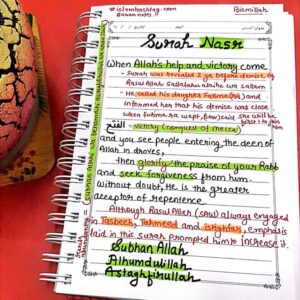Quran Notes : Continuing our weekly Quran Journal series, here we are with reflection on Quran- Surah An-Nasr and Surah Al Lahab. We will also outline the reason why Abu Lahab is cursed, why Quran condemns Abu Lahab.
Surah An Nasr
The Surah takes its name from the word occurring in the first verse-nasr
Hadrat Abdullah bin Abbas states that this is the last Surah of the Quran to be revealed
Allah in this Surah had informed His Messenger (upon whom be peace) that when Islam attained complete victory in Arabia and the people started entering Allah’s religion in great numbers, it would mean that the mission for which he had been sent to the world, had been fulfilled. Then, he was enjoined to busy himself in praising and glorifying Allah by Whose bounty he had been able to accomplish such a great task, and should implore Him to forgive whatever failings and frailties he might have shown in the performance of the service. Here, by a little consideration one can easily see the great difference that there is between a Prophet and a common worldly leader. If a worldly leader in his own lifetime is able to bring about a revolution, which has the aim and objective of his struggle, this would be an occasion for exultation for him. But here we witness quite another phenomenon.
The Messenger of Allah in a brief space of 23 years revolutionized an entire nation as regards its beliefs, thoughts, customs, morals, civilization, ways of living, economy, politics and fighting ability, and raising it from ignorance and barbarism enabled it to conquer the world and become leader of nations; yet when he had accomplished this unique task, he was not enjoined to celebrate it but to glorify and praise Allah and to pray for His forgiveness, and he busied himself humbly the implementation of that command.
Ibn Abbas has stated that after the revelation of this Surah the Holy Messenger (upon whom be peace) began to labour so intensively and devotedly hard for the Hereafter as he had never done before.
Allah in this command has taught Muslims an eternal lesson: Do not regard any of your worship, devotion or religious service as something superb; even if you have spent your entire life in the cause of Allah, you should always think that you could not do all that was required of you by your Lord.
Likewise, when you attain some victory, you should not regard it as a result of some excellence in yourselves but as a result of only Allah’s bounty and favor. Then bowing humbly before your Lord, you should praise and glorify Him, and should repent and beg for His forgiveness instead of boasting and bragging of your success and victory.
Surah Al Lahab
The Surah takes its name from the word in the first verse-Lahab.
This is the only place in the Quran where a person from among the enemies of Islam has been condemned by name.
Why Quran Condemns Abu Lahab?
- It is related from Ibn Abbas with several chains of transmitters the tradition that when the Holy Prophet was commanded to present the message of Islam openly, and he was instructed in the Quran to warn first of all his nearest kinsfolk of the punishment of God, he ascended the Mount, Safa one morning and called out aloud: (O, the calamity of the morning!). This alarm in Arabia was raised by the person who noticed early at dawn an enemy tribe advancing against his tribe. When the Holy Messenger made this call, the people enquired as to who had made the call. They were told that it was Muhammad (upon whom be Allah’s peace). Thereat the people of all the clans of Quraish rushed out. Everyone who could, came; he who could not, sent another one for himself. When the People had assembled, the Holy Messenger calling out each clan by name, viz. O Bani Hashim, O Bani Abdul Muttalib, O Bani Fihr, O Bani so and so, said: “If I were to tell you that behind the hill there was an enemy host ready to fall upon you, would you believe me?”The people responded with one voice, saying that they never had so far experienced a lie from him. The Holy Prophet said: “Then I warn you that you are heading for a torment.” Thereupon, before anyone else could speak, Abu Lahab, the Holy Prophet’s uncle, said: “May you perish!Did you summon us for this?”Another tradition adds that he picked up a stone to throw at the Holy Prophet. (Musnad Ahmad, Bukhari, Muslim, Tirmidhi, Ibn Jarir, and others).
- According to Ibn Zaid, one day Abu Lahab asked the Holy Prophet: “If I were to accept your religion, what would I get?” The Holy Prophet replied: “You would get what the other believers would get.” He said: “Is there no preference or distinction for me?” The Holy Prophet replied: “What else do you want?” Thereupon he said: “May this religion perish in which I and all other people should be equal and alike!” (Ibn Jarir).
- In Makkah Abu Lahab was the next door neighbour of the Holy Prophet. Their houses were separated by a wall. Besides him, Hakam bin As (Father of Marwan), Uqbah bin Abi Muait, Adi bin Hamra and Ibn al-Asda il-Hudhali also were his neighbours. These people did not allow him to have peace even in his own house. Sometimes when he was performing the Prayer, they would place the goat’s stomach on him; sometimes when food was being cooked in the courtyard, they would throw filth at the cooking pot. The Holy Prophet would come out and say: “O Bani Abdi Manaf, what kind of neighborliness is it?”Abu Lahab’s wife, Umm Jamil (Abu Sufyan’s sister), had made it a practice to cast thorns at his door in the night so that when he or his children came out of the house at dawn, they should run thorns in the foot. (Baihaqi, Ibn Abi Hatim, Ibn Jarir, Ibn Asakir, Ibn Hisham).
- Before the proclamation of Prophethood, two of the Holy Prophet’s daughters were married to two of Abu Lahab’s sons, Utbah and Utaibah. After his call when the Holy Prophet began to invite the people to Islam, Abu Lahab said to both his sons:”I would forbid myself seeing and meeting you until you divorced the daughters of Muhammad (upon whom be Allah’s peace and blessings).”So, both of them divorced their, wives.
- Abu Lahab’s wickedness can be judged from the fact that when after the death of the Holy Prophet’s son Hadrat Qasim, his second son, Hadrat Abdullah, also died, this man instead of condoning with his nephew in his bereavement, hastened to the Quraish chiefs joyfully to give them the news that Muhammad (upon whom be Allah’s peace and blessings) had become childless that night.
- Wherever the Holy Prophet went to preach his message of Islam, this man followed him and forbade the people to listen to him. Rabiah bin Abbad ad- Dill has related:”I was a young boy when I accompanied my father to the face of Dhul-Majaz. There I saw the Holy Messenger (may peace be upon him) who was exhorting the people, saying: “O people, say: there is no deity but Allah, you will attain success.’Following behind him I saw a man, who was telling the people; “This fellow is a liar: he has gone astray from his ancestral faith.” I asked; who is he?The people replied: He is his uncle, Abu Lahab.” (Musnad Ahmad, Baihaqi). Another tradition from Hadrat Rabiah is to the effect; “I saw that the Holy Prophet went to the halting place of each tribe and said: `O children of so and so, I have been appointed Allah’s Messenger to you. I exhort you to worship only Allah and to associate none with Him. So, affirm faith in me and join me so that I may fulfill the mission for which I have been sent.’Following close behind him there was a man who was saying: `O children of so and so, he is leading you astray from Lat and Uzza and inviting you to the religion of error and innovation which he has brought. Do not at all listen to what he says and do not follow him.’ I asked my father: who is he?He replied: he is his uncle, Abu Lahab.” (Musnad Ahmad, Tabarani). Tariq bin Abdullah al-Muharibi’s tradition is similar. He says: “I saw in the fare of Dhul-Majaz that the Holy Messenger (upon whom be peace) was exhorting the people, saying: `O people, say , you will attain success’, and behind him there was a man who was casting stones at him, until his heels bled, and he was telling the people: ‘Do not listen to him, he is a liar.’ I asked the people who he was. They said he was his uncle, Abu Lahab.” (Tirmidhi).
- In the 7th year of Prophethood, when all the clans of Quraish boycotted the Bani Hashim and the Bani al- Muttalib socially and economically, and both these clans remaining steadfast to the Holy Prophet’s support, were besieged in Shib Abi Talib, Abu Lahab was the only person, who sided with the disbelieving Quraish against his own clan. This boycott continued for three years, so much so that the Bani Hashim and the Bani al- Muttalib began to starve. This, however, did not move Abu Lahab. When a trade caravan came to Makkah and a besieged person from Shib Abi Talib approached it to buy some article of food, Abu Lahab would shout out to the merchants to demand a forbidding price, telling them that he would make up for any loss that they incurred. Thus, they would demand exorbitant rates and the poor customer had to return empty handed to his starving children. Then Abu Lahab would purchase the same articles from them at the market rates. (Ibn Sa’d, Ibn Hisham).
On account of these very misdeeds this man was condemned in this Surah by name, and there was a special need for it. When the Holy Prophet’s own uncle followed and opposed him before the Arabs who came for hajj from outside Makkah, or gathered together in the fares held at different places, they regarded it as against the established traditions of Arabia that an uncle should run down his nephew without a reason, should pelt stones at him and bring false accusations against him publicly. They were, therefore, influenced by what Abu Lahab said and were involved in doubt about the Holy Prophet (upon whom be peace). But when this, Surah was revealed, and Abu Lahab, filled with rage, started uttering nonsense, the people realized that what he said in opposition to the Holy Prophet was not at all reliable, for he said all that in his mad hostility to his nephew.
Also read : Quran notes
Note : We post Quran reflection on our Instagram and Facebook almost daily. If you want, you can follow us on Instagram.
Discover more from Islam Hashtag
Subscribe to get the latest posts sent to your email.





